The King's Speech
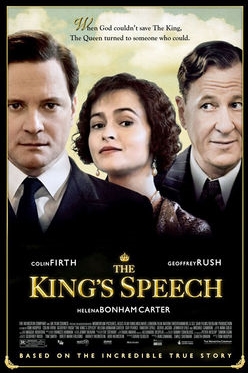
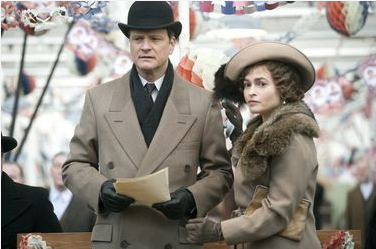 The film is a fairly standard dramatic retelling of the rise of King George VI (played with much conviction by Colin Firth), and his long personal battle with a childhood speech impediment. As the film kicks off, he's still Prince Albert (Bertie to his friends and family), and he gives a disastrous public address at Wembley Stadium in 1925, thanks to his uncontrollable stutter. Certain that his brother Edward (Guy Pearce) is next in line for the throne after their father (Michael Gambon), Albert shies away from public view, and tries a variety of quack doctors to help with his impediment. That's when his wife, Elizabeth (Helena Bonham Carter, understated and charming here), discovers the services of Lionel Logue (Geoffrey Rush), an Australian wannabe actor turned unorthodox speech therapist, who believes that his particular method of treatment can help her husband. Lionel's methods clash with Albert initially, as Lionel does not believe in making house calls, and also insists on treating Albert as an equal, referring to him as "Bertie" instead of a royal title. Naturally, the two eventually begin to bond, especially when Albert learns that he can control his stutter.
The film is a fairly standard dramatic retelling of the rise of King George VI (played with much conviction by Colin Firth), and his long personal battle with a childhood speech impediment. As the film kicks off, he's still Prince Albert (Bertie to his friends and family), and he gives a disastrous public address at Wembley Stadium in 1925, thanks to his uncontrollable stutter. Certain that his brother Edward (Guy Pearce) is next in line for the throne after their father (Michael Gambon), Albert shies away from public view, and tries a variety of quack doctors to help with his impediment. That's when his wife, Elizabeth (Helena Bonham Carter, understated and charming here), discovers the services of Lionel Logue (Geoffrey Rush), an Australian wannabe actor turned unorthodox speech therapist, who believes that his particular method of treatment can help her husband. Lionel's methods clash with Albert initially, as Lionel does not believe in making house calls, and also insists on treating Albert as an equal, referring to him as "Bertie" instead of a royal title. Naturally, the two eventually begin to bond, especially when Albert learns that he can control his stutter.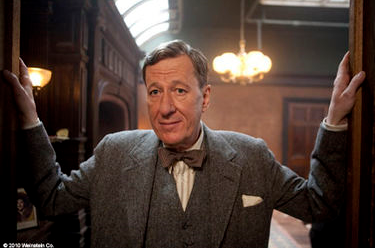 There are subplots, of course. One concerning his brother Edward, and his desire to to marry a twice-divorced American woman. A scandal rises because of this, forcing Edward to give up his crown after he takes the throne with their father's passing. This leaves Albert as the King just as World War II is about to erupt. There are some cameos by historical figures to give the film some context, including Winston Churchill (Timothy Spall, giving a dead-on performance), but the real heart of the film is not the historical trappings, but rather the relationship that builds between the future King, and his speech therapist. The screenplay by David Seidler (Quest for Camelot) allows these characters to be human, flawed, and sometimes quite funny, so we can relate to both of the characters as they go from trading verbal barbs, to mutual respect. We may have seen this kind of relationship done before, but seldom this well.
There are subplots, of course. One concerning his brother Edward, and his desire to to marry a twice-divorced American woman. A scandal rises because of this, forcing Edward to give up his crown after he takes the throne with their father's passing. This leaves Albert as the King just as World War II is about to erupt. There are some cameos by historical figures to give the film some context, including Winston Churchill (Timothy Spall, giving a dead-on performance), but the real heart of the film is not the historical trappings, but rather the relationship that builds between the future King, and his speech therapist. The screenplay by David Seidler (Quest for Camelot) allows these characters to be human, flawed, and sometimes quite funny, so we can relate to both of the characters as they go from trading verbal barbs, to mutual respect. We may have seen this kind of relationship done before, but seldom this well.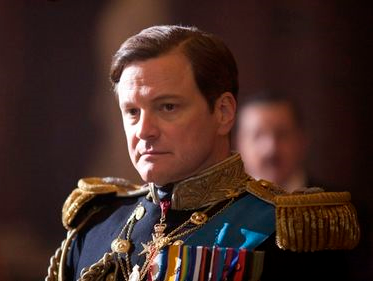 It is the performances that truly give The King's Speech much of its dramatic weight. There are so many standouts here, it may be hard for Oscar voters to choose. There's Firth, who gives a performance of quiet dignity, with loud rage bubbling underneath, ready to explode at a moment's notice. He wisely does not overplay his verbal handicap, and hits just the right note that we sympathize with him, but do not pity him. He is a strong and natural-born leader, held back only by his own self doubt. While the character may not have come across as entirely three dimensional in Seidler's script, Firth's performance and his mixture of royal pride and personal self-loathing sells the character wonderfully to the audience.
It is the performances that truly give The King's Speech much of its dramatic weight. There are so many standouts here, it may be hard for Oscar voters to choose. There's Firth, who gives a performance of quiet dignity, with loud rage bubbling underneath, ready to explode at a moment's notice. He wisely does not overplay his verbal handicap, and hits just the right note that we sympathize with him, but do not pity him. He is a strong and natural-born leader, held back only by his own self doubt. While the character may not have come across as entirely three dimensional in Seidler's script, Firth's performance and his mixture of royal pride and personal self-loathing sells the character wonderfully to the audience.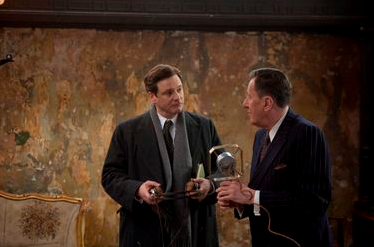 Meeting him every step of the way is Rush, giving one of his best performances in a while. He rises above the cliche of the offbeat mentor, and turns Lionel into a fleshed out character with a family, personal desires, and a genuine bond that we can feel growing with Firth's character as the film progresses. Likewise, Helena Bonham Carter (best known for her offbeat work in Tim Burton's films these days) gets to display some genuine warmth here, and is quietly understated. Yet, she never disappears into the background, like you expect her to. She's a constant presence in the life of her husband, and gives the sense that she is just as important to the King's emotional and vocal healing as the speech therapist is.
Meeting him every step of the way is Rush, giving one of his best performances in a while. He rises above the cliche of the offbeat mentor, and turns Lionel into a fleshed out character with a family, personal desires, and a genuine bond that we can feel growing with Firth's character as the film progresses. Likewise, Helena Bonham Carter (best known for her offbeat work in Tim Burton's films these days) gets to display some genuine warmth here, and is quietly understated. Yet, she never disappears into the background, like you expect her to. She's a constant presence in the life of her husband, and gives the sense that she is just as important to the King's emotional and vocal healing as the speech therapist is.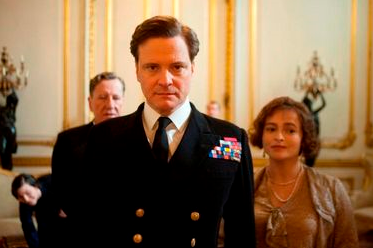 So, is this just a feel-good movie with a lot of great performances to lift it above the norm? While it does suffer from some trappings of the genre (certain lines, like when Firth bellows "I have a voice" in defiant anger, seem tailor made to be an Oscar clip or a clip for the trailer), what pushes it above the norm is not just the performances, but that it is also highly entertaining to watch. The movie never slows down in its nearly two hour run time, nor does it ever feel it is losing focus on the characters by cramming in too much historical detail. Director Tom Hooper (TV mini-series John Adams) avoids the stuffy trappings of a dull historical drama by putting such a strong emphasis on the relationships at the heart of the story, and making us care about the characters.
So, is this just a feel-good movie with a lot of great performances to lift it above the norm? While it does suffer from some trappings of the genre (certain lines, like when Firth bellows "I have a voice" in defiant anger, seem tailor made to be an Oscar clip or a clip for the trailer), what pushes it above the norm is not just the performances, but that it is also highly entertaining to watch. The movie never slows down in its nearly two hour run time, nor does it ever feel it is losing focus on the characters by cramming in too much historical detail. Director Tom Hooper (TV mini-series John Adams) avoids the stuffy trappings of a dull historical drama by putting such a strong emphasis on the relationships at the heart of the story, and making us care about the characters.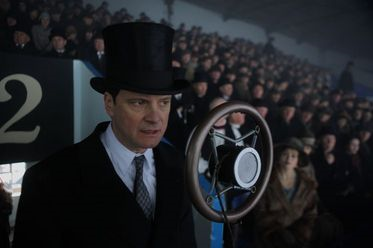
See the movie times in your area or buy the DVD at Amazon.com!






0 Comments:
Post a Comment
<< Home